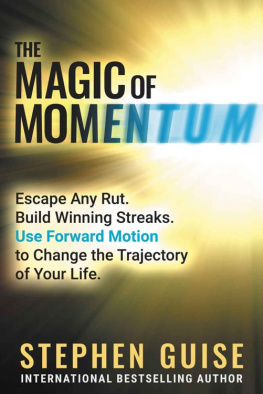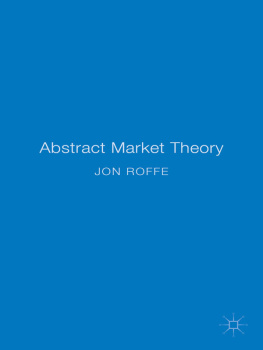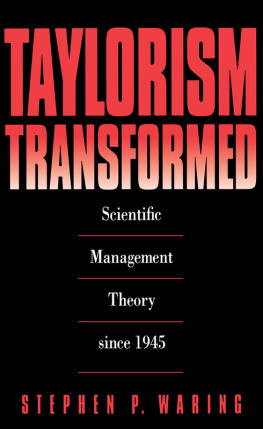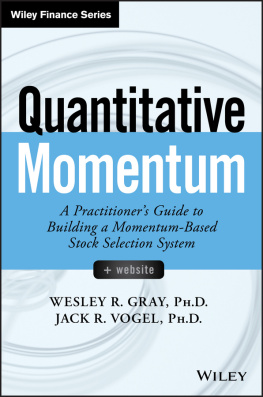Satchell Stephen - Market Momentum: Theory and Practice
Here you can read online Satchell Stephen - Market Momentum: Theory and Practice full text of the book (entire story) in english for free. Download pdf and epub, get meaning, cover and reviews about this ebook. year: 2020, genre: Business. Description of the work, (preface) as well as reviews are available. Best literature library LitArk.com created for fans of good reading and offers a wide selection of genres:
Romance novel
Science fiction
Adventure
Detective
Science
History
Home and family
Prose
Art
Politics
Computer
Non-fiction
Religion
Business
Children
Humor
Choose a favorite category and find really read worthwhile books. Enjoy immersion in the world of imagination, feel the emotions of the characters or learn something new for yourself, make an fascinating discovery.

- Book:Market Momentum: Theory and Practice
- Author:
- Genre:
- Year:2020
- Rating:3 / 5
- Favourites:Add to favourites
- Your mark:
- 60
- 1
- 2
- 3
- 4
- 5
Market Momentum: Theory and Practice: summary, description and annotation
We offer to read an annotation, description, summary or preface (depends on what the author of the book "Market Momentum: Theory and Practice" wrote himself). If you haven't found the necessary information about the book — write in the comments, we will try to find it.
Market Momentum: Theory and Practice — read online for free the complete book (whole text) full work
Below is the text of the book, divided by pages. System saving the place of the last page read, allows you to conveniently read the book "Market Momentum: Theory and Practice" online for free, without having to search again every time where you left off. Put a bookmark, and you can go to the page where you finished reading at any time.
Font size:
Interval:
Bookmark:
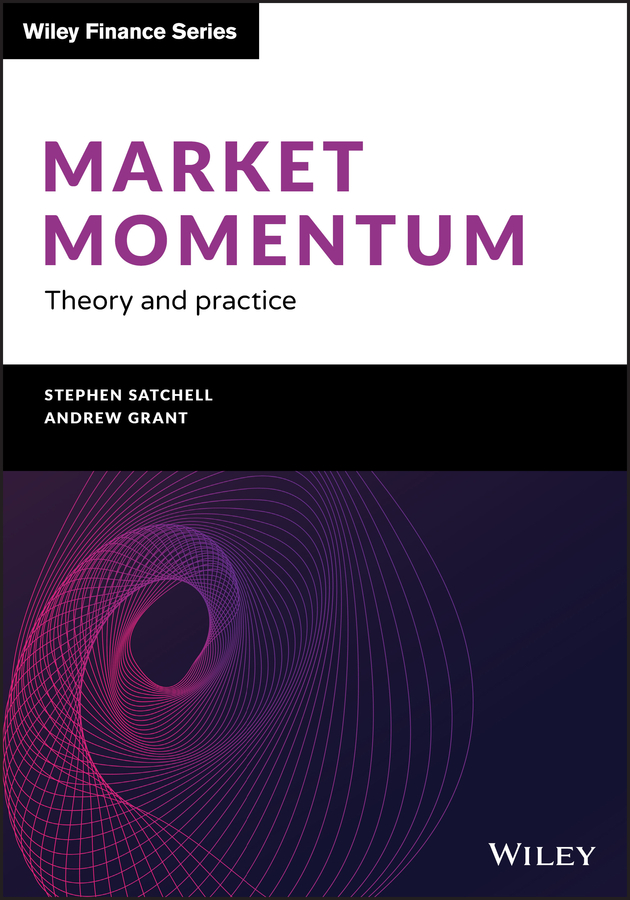
- Introduction
- Chapter 3
- Chapter 4
- Chapter 6
- Chapter 8
- Chapter 9
- Chapter 10
- Chapter 11
- Chapter 12
- Chapter 13
- Chapter 14
- Chapter 15
- Chapter 16
- Chapter 17
- f05
- Chapter 3
- Chapter 4
- Chapter 5
- Chapter 6
- Chapter 7
- Chapter 8
- Chapter 9
- Chapter 10
- Chapter 12
- Chapter 13
- Chapter 14
- Chapter 15
- Chapter 16
By
STEPHEN SATCHELL
and
ANDREW GRANT

This edition first published 2021
2021 Stephen Satchell and Andrew Grant
Registered office
John Wiley & Sons Ltd, The Atrium, Southern Gate, Chichester, West Sussex, PO19 8SQ, United Kingdom
For details of our global editorial offices, for customer services and for information about how to apply for permission to reuse the copyright material in this book please see our website at www.wiley.com.
All rights reserved. No part of this publication may be reproduced, stored in a retrieval system, or transmitted, in any form or by any means, electronic, mechanical, photocopying, recording or otherwise, except as permitted by the UK Copyright, Designs and Patents Act 1988, without the prior permission of the publisher.
Wiley publishes in a variety of print and electronic formats and by print-on-demand. Some material included with standard print versions of this book may not be included in e-books or in print-on-demand. If this book refers to media such as a CD or DVD that is not included in the version you purchased, you may download this material at http://booksupport.wiley.com. For more information about Wiley products, visit www.wiley.com.
Designations used by companies to distinguish their products are often claimed as trademarks. All brand names and product names used in this book are trade names, service marks, trademarks or registered trademarks of their respective owners. The publisher is not associated with any product or vendor mentioned in this book.
Limit of Liability/Disclaimer of Warranty: While the publisher and author have used their best efforts in preparing this book, they make no representations or warranties with respect to the accuracy or completeness of the contents of this book and specifically disclaim any implied warranties of merchantability or fitness for a particular purpose. It is sold on the understanding that the publisher is not engaged in rendering professional services and neither the publisher nor the author shall be liable for damages arising herefrom. If professional advice or other expert assistance is required, the services of a competent professional should be sought.
Library of Congress Cataloging-in-Publication Data
Names: Grant, Andrew Robert, 1982- author. | Satchell, Stephen Ellwood, 1949- author.
Title: Market momentum : theory and practice / Andrew Robert Grant, Stephen Ellwood Satchell.
Description: First Edition. | Hoboken : Wiley, 2020. | Series: The wiley finance series | Includes index.
Identifiers: LCCN 2020020406 (print) | LCCN 2020020407 (ebook) | ISBN 9781119599326 (hardback) | ISBN 9781119599470 (adobe pdf) | ISBN 9781119599371 (epub)
Subjects: LCSH: Investment analysis. | SecuritiesPrices. | EconomicsPsychological aspects.
Classification: LCC HG4529 .G73 2020 (print) | LCC HG4529 (ebook) | DDC 332.63/2042dc23
LC record available at https://lccn.loc.gov/2020020406
LC ebook record available at https://lccn.loc.gov/2020020407
Cover Design: Wiley
Cover Image: palamatic/shutterstock
1 Andrew Grant
This chapter examines the behavioural finance argument for the existence of momentum profits. From a behavioural finance perspective, asset prices may deviate from fundamental values, which can persist if market frictions prevent a prompt correction to mispricing. As risk, in the form of a Fama-French three-factor model, has been shown to provide a poor explanation for momentum returns, academics have sought psychology-inspired reasons for the phenomenon. We review the literature on behavioural finance and momentum, starting with the theoretical studies of the late 1990s, which have become highly influential. Following on from this, we discuss the recent empirical evidence supporting predictions such as slow information diffusion, incorrect updating of beliefs, trading at the 52-week high, individual investor trading and market-wide sentiment. Among the key insights is that behavioural finance can help provide an explanation for statistical patterns that generate momentum portfolios (as in ) and may help practitioners in identifying themes for enhancing their investment portfolios.
2 Steve Satchell
In this chapter we look at different momentum strategies and their properties. Many of the empirical results of momentum strategies can be seen to result from the structure of return processes and the design of the strategy. In particular, considering simple cases, we investigate the return distributions of what are the major momentum strategies which are cross-sectional momentum (CSM), time-series momentum (TSM), relative strength strategies (RSS) and cross-asset momentum. For the case of two assets, we can say a great deal about the structure and properties of returns. From a statistical perspective, behavioural analysis will determine the magnitude of model parameters along with, in some cases, the specification of the model itself. Taking these as given, the statistical analysis will determine the properties of the strategy returns. In this form of analysis, we are interested in the population moments such as the mean, variance, skewness and kurtosis but also the time-series moments of the momentum process. It is hoped that the relatively simple analysis in this chapter will help the reader in later chapters.
3 Nick Baltas and Robert Kosowski
Motivated by studies of the impact of frictions on asset prices, we examine the effect of key components of time-series momentum strategies on turnover and performance. We show that more efficient volatility estimation and price-trend detection can significantly reduce portfolio turnover by more than one-third, without causing a statistically significant performance degradation. We propose a novel implementation of the strategy that incorporates the pairwise signed correlations by means of a dynamic leverage mechanism. The correlation-adjusted variant outperforms the nave implementation of the strategy and the outperformance is more pronounced in the post-2008 period. Finally, using a transaction costs model for futures-based strategies that separates costs into roll-over and rebalancing costs, we show that our findings remain robust to the inclusion of transaction costs
4 Jose Menchero and Lei Ji
In this chapter, we study the risk and return of momentum in developed equity markets. We construct factor portfolios by cross-sectional regression. Univariate regression results in simple factor portfolios that contain incidental bets on other factors. Multivariate regression results in pure factor portfolios that are neutral to all factors except momentum. We compare performance of simple and pure momentum factors across various developed markets. We find that simple and pure factors have virtually identical long-term performance within each equity market. The pure factors, however, achieve this performance with considerably lower volatility, resulting in higher risk-adjusted performance. We also study the volatilities and correlations of momentum factors across time. We find that these quantities peaked during the Internet Bubble and the Financial Crisis. Finally, we show that for most periods, momentum has been negatively correlated with the market, thus offering attractive diversification opportunities.
Next pageFont size:
Interval:
Bookmark:
Similar books «Market Momentum: Theory and Practice»
Look at similar books to Market Momentum: Theory and Practice. We have selected literature similar in name and meaning in the hope of providing readers with more options to find new, interesting, not yet read works.
Discussion, reviews of the book Market Momentum: Theory and Practice and just readers' own opinions. Leave your comments, write what you think about the work, its meaning or the main characters. Specify what exactly you liked and what you didn't like, and why you think so.


